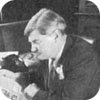
| Nye Bevan
Aneurin Bevan, usually known as Nye Bevan (November 15, 1897�July 6, 1960) was a Welsh Labour politician regarded as a hero of the left, primarily for his role in the formation of the National Health Service.
In 1919 he won a scholarship to the Central Labour College in London, sponsored by the South Wales Miners' Federation. At the college he gained his life-long respect for Karl Marx.
In 1928 he won a seat on Monmouthshire County Council. With that success he was picked as the Labour Party candidate for Ebbw Vale (displacing the sitting MP), and easily won it in the 1929 General Election. He had solid support from his constituency, being one of the few Labour MPs to be unopposed in the 1931 General Election.
He was an early opponent of Fascism, arguing for British support for the socialists in Spain and visiting the country.
He was a strong critic of the policies of Neville Chamberlain, arguing that his old enemy Winston Churchill should be given power. During the war he was one of the leaders of the left in the Commons, opposing the wartime Coalition government. Bevan opposed the heavy censorship imposed on radio and newspapers and wartime Defence Regulation 18B that gave the Home Secretary the powers to intern citizens without trial. Bevan called for the nationalisation of the coal industry and advocated the opening of a Second Front in Western Europe in order to help the Soviet Union in its fight with Germany. Churchill responded by calling Bevan the "Minister of Disease".
At the beginning of the 1945 general election campaign Bevan told his audience: "We have been the dreamers, we have been the sufferers, now we are the builders. We enter this campaign at this general election, not merely to get rid of the Tory majority. We want the complete political extinction of the Tory Party."
After Labour victory in the General Election of 1945 Bevan was surprisingly appointed by the Prime Minister Clement Attlee as Minister of Health. In this Parliament Labour had a sufficient majority to push through its Welfare State, despite constant attacks on Bevan from the Conservatives. In 1946 the National Insurance Act was passed, abolishing the last remnants of the Poor law and putting in place more generous unemployment, sickness, maternity and widows' benefits and better state pensions, all funded by compulsory contributions from employer and employee. This course of action had been recommended by the Beveridge report of 1942 entitled Social Insurance and Allied Services.
In 1948 the National Health Service Act created the National Health Service. The people of Britain were provided with free diagnosis and treatment of illness, at home or in hospital, as well as dental and ophthalmic services. Despite his successes Bevan was down-graded to Minister of Labour in 1951, but soon resigned in protest at Hugh Gaitskell's introduction of prescription charges (for dental care and spectacles),
After the 1955 general election, Attlee retired as leader. Bevan contested the leadership against both Morrison and Labour right-winger Hugh Gaitskell but it was Gaitskell who emerged victorious. In 1959 despite suffering from terminal cancer, Bevan was elected as Deputy Leader of the Labour Party. He could do little in his new role and died the next year at the age of 62.
|
